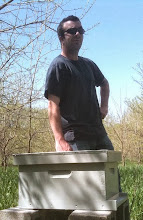
If you're planting a garden this spring, why not make it one the bees will enjoy as much as you do?
Bee gardens, as you have no doubt surmised, feature flowers that attract bees. Honeybees (Apis mellifera) are just one of about 3,500 species of bees in North America, almost all of which are pollinators. Other notable species include bumblebees, orchard mason bees, digger bees, carpenter bees and cuckoo bees, to name only a few.
Bees visit flowers to harvest nectar and pollen, both of which they use for food: nectar sustains the bees on their foraging flights to and from the hive, and pollen is collected and stored in the hive to feed the larvae. Pollination occurs incidentally, when pollen from one flower clings to the hairs covering the bees' bodies, and is transferred to the next flowers visited - resulting in more plants with more flowers. The garden benefits from this free pollination, the bees benefit from more flowers with more nectar and pollen, and gardeners (and farmers) benefit from increased yield. The disadvantages? None.
In light of the alarming decline of the bees' population in recent years, planting a bee garden is a small but invaluable step that anyone can take in order to ensure that bees can continue their vital contribution to the ecosystem as a whole. While bee gardens aren't a solution to the bees' population crisis, they do offer much-needed help to our often-overlooked partners in survival, who assist so much and ask so little. And every little bit counts.
Click the pic above to enlarge a short list of plants that are guaranteed to attract bees. This list represents only a small fraction of the plants that bees love to visit, but it may give you some ideas. And if you keep your eyes open, there's a good chance you'll see some types of bees you've never noticed before. Ideally, it's best to use flowering plants that are native to your area, so as to encourage established colonies of local bee species.





No comments:
Post a Comment